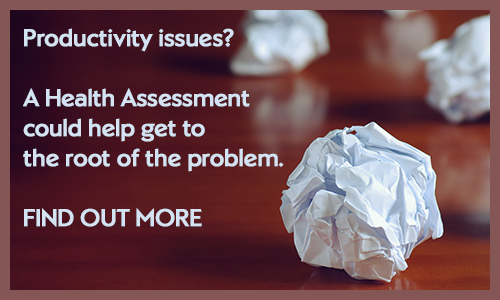How to relieve stress at work
- Overview
Practice mindfulness

Being ‘mindful’ is about being focused on what is happening in the present moment. Research suggests that on average up to 45% of our time in a day may be spent ‘mind-wandering’, which is when we are thinking about something that we are not currently doing. Being able to focus on the present moment is often difficult in the workplace due to our workload and task lists.
There are many forms of mindfulness. These include:
- Sense checking - dialling into each of your senses and focusing on what each can detect;
- Heart-focused breathing - taking slow and controlled breaths whilst focusing on the feeling of the heart;
- Mindful eating - savouring the taste of the food you are eating but doing so in a relaxed environment i.e. not whilst doing work or checking emails.
People respond to different forms of mindfulness in different ways so aim to find one that works for you.
Break down big tasks into manageable targets
Sometimes your work can seem insurmountable. Not knowing where to start, or feeling overwhelmed by the volume of work is a fast track to stress. One thing you can try to prevent this is to break larger tasks down into smaller targets or stages. This will help you to focus on the task in hand step by step. Each step you complete will feel like a small victory, turning a negative into a positive and helping your brain to process the overall project easier.
Although it may not fit every scenario, you can also look at making your objectives SMART (specific, measureable, achievable, realistic and with a set timeframe). This may help to break your workload down into a manageable format. Being realistic with what you can do in the time that you have may help to lighten the perceived burden.
Leave your desk regularly
The idea of taking a break from a busy work schedule can be a difficult thing to comprehend. An analogy that demonstrates the value of taking a break is that of ‘sharpening the saw’; you see a person trying to cut down a tree with a blunt saw and you suggest to them to sharpen their saw to help complete the task quicker, however they tell you that they cannot stop to sharpen the saw because it takes time. By making time to take a break and re-channel your focus you may actually get your work completed quicker and to a better standard.
Go to the gym first thing or at lunch
Exercise is a great way to start the day positively and give you energy. You can also use your lunch break to go to the gym, which will give you a real energy boost and relieve stress.
When we get stressed, we often create tension in our upper back and neck. By completing aerobic exercise as well as resistance training, we increase our body’s physical awareness of what muscle tension feels like and when the body is more aware of this feeling, it becomes a physical cue to take a moment to breathe and actively relax the muscles.
Physical exercise also uses the stress hormones that we build up as a fuel source so can be a great way to release tension.
Some specific exercises such as Yoga have been found to increase the activation of the body’s internal relaxation system due to the deep breathing involved.
Keep sugar levels balanced
Having big spikes of energy followed by lows (due to our body's homeostatic system trying to bring the blood sugar back to normal) promotes irritability and lethargy, which are also signs of stress. So controlling energy throughout the day would be a useful strategy to help better manage stress.
Prevent energy lows by balancing your blood sugar. Do this by never skipping a meal, avoiding sugary snacks (which give you an instant energy peak that is followed quickly by a trough) and combining carbohydrates with plenty of protein such as eggs or meat. Find out more about how to maintain your sugar balance.
Limit caffeine intake
Caffeine is a stimulant which can feel like it’s giving you energy, but as it increases your heart rate it can increase your feelings of anxiety and stress. Caffeine consumed in the afternoon will also likely have an impact on sleep quality as it affects the areas of the brain responsible for recognising the need to sleep. A poor quality sleep (even if you have slept for 7-8 hours) will make relieving stress all the more difficult.
Try swapping coffee for red bush tea, which contains antioxidants that help to provide you with energy without the stimulants in caffeine. Green tea is a healthy option too but it does still contain caffeine so the naturally caffeine-free red bush tea may be a better option.
Last updated Tuesday 23 January 2024
First published on Monday 23 May 2016

